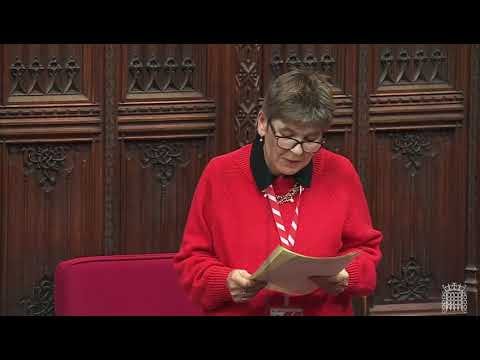Football Governance Bill: kick it out
My speech to the House of Lords on why I’m very worried about the creation of an independent football regulator. PLUS join us for an online event debating the legalisation of assisted dying.
This week the House of Lords had a Second Reading debate on the Football Governance Bill. It’s an unlikely topic for me to speak out on, except that as always, the beautiful game is being used as a political football to virtue signal, and yet another area of life the state seems to want to colonise.
Football plays a role in our national life unlike any other sport and many fans have long been angered by the way their clubs have been managed. If the Bill confined itself narrowly to financial sustainability, it might make sense. Although arguably – as the Bill gives unprecedented powers to a new Independent Football Regulator to preside over wealth redistribution - it could damage financially thriving clubs. But it goes way beyond propping up struggling clubs, with Labour adding additions to the Bill suggesting that the independent regulator will exhibit all the age-old tendencies of bureaucracy to grow arms and legs, stifling what is good about the game rather than supporting fans. Indeed, for all the rhetoric about this legislation being fan-led, I am sceptical. After all, politicians have spent recent years demonising the wrong kind of fans, and encouraging behaviour codes aimed at sanitising the terraces.
Lord Goodman has produced a very useful thread on X/Twitter explaining many of the issues and controversies, including arguments about the way money is spread through the football ‘pyramid’, the involvement of fans in decision making and the relationship with international bodies like UEFA. Lord Ranger spoke eloquently about the importance of football to supporters and communities, and how any independent regulator ‘must tread lightly’ - with comparisons to the atmosphere-killing introduction of VAR. (You can listen to the Battle of Ideas festival debate on VAR here.)
In particular, I wanted to challenge the way the new laws propose to mandate enhanced EDI measures as proof of good football clubs’ governance. But individual clubs’ own EDI policies are already causing problems for fans; forcing these on all teams, backed by a regulator with power to punish clubs that don’t comply, will undoubtedly make things worse.
In my speech, I talk about two cases that should act as warnings. Linzi Smith, who has been a die-hard Newcastle United fan for many years, found herself banned by the club for expressing her views on social media about the reality of biological sex, after a worrying and secretive investigation supported by the Premier League.
In the second case, a 17-year-old female footballer with suspected autism was banned for six matches for asking a transgender player with a beard playing in an opposing WOMEN’S TEAM: ‘Are you a man?’ This is despite the girl insisting she didn’t mean any offence by the question. Lord Triesman, the former chair of the Football Association, spoke powerfully about the case in the same debate. Both these cases suggest that adding another layer of officialdom in the current circumstances will make things even worse.
You can watch the video of the speech below or via YouTube.
Assisted dying bill: for or against?
Tuesday 26 November at 7:00 pm - 9:00 pm (UK time)
This online event is free of charge, but please register via Eventbrite.
With Parliament about to vote on the issue for the first time since 2015, join us for a discussion on the rights and wrongs of legalisation.
The House of Commons will vote on Labour MP Kim Leadbeater’s Terminally Ill Adults (End of Life) Bill on 29 November. The Bill claims to ‘allow adults who are terminally ill, subject to safeguards and protections, to request and be provided with assistance to end their own life’, although there have been complaints about delays in publishing the full text of the Bill, which finally appeared on Monday 11 November.
While assisted suicide is currently illegal in the UK, the proposed legislation would make an exception on request for patients with six months left to live, with permission from medical professionals. Leadbeater presents assisted suicide as a matter of free choice and dignity, and argues that those without the option will take the situation into their own hands, causing unnecessary distress for those around them.
However, there are doubts – including from the health secretary, Wes Streeting – that the bill will guard effectively against situations in which people are coerced to die, either by family members or by a state that is too often incapable of providing adequate palliative care. In the US state of Oregon, whose Death With Dignity Act bears resemblance to the UK’s Terminally Ill Adults Bill, a majority of people who choose to die cite fears about becoming a burden for their loved ones.
Is the current law a ‘cruel mess,’ to quote campaigner Dame Esther Rantzen – or is it necessary to prevent slippery slopes? Could the interests of our welfare state undermine the Bill’s protections? And how should we square a patient’s freedom of choice with existing frameworks of medical ethics?
SPEAKERS
James Esses
barrister; writer, commentator and advocate, specialising in the impact of ideology on society; co-founder, Thoughtful Therapists
Rabbi Dr Jonathan Romain MBE
chair, Dignity in Dying, the UK’s leading campaign for a change in the law on assisted dying; head of the Rabbinic Court of Great Britain; author of several books with the central theme of reforming Judaism, including The Naked Rabbi: His Colourful Life, Campaigns and Controversies and Confessions of a Rabbi.
Sonia Sodha
chief leader writer at the Observer and a Guardian/Observer columnist. She also makes documentaries on economic and social issues for Radio 4 and appears regularly on the BBC, Sky News and Channel 4 as a political commentator.
Professor Kevin Yuill
emeritus professor of history, University of Sunderland; author, Assisted Suicide: the liberal, humanist case against legalization.



